英汉翻译词性转换
词性转换、一词多译(英汉)
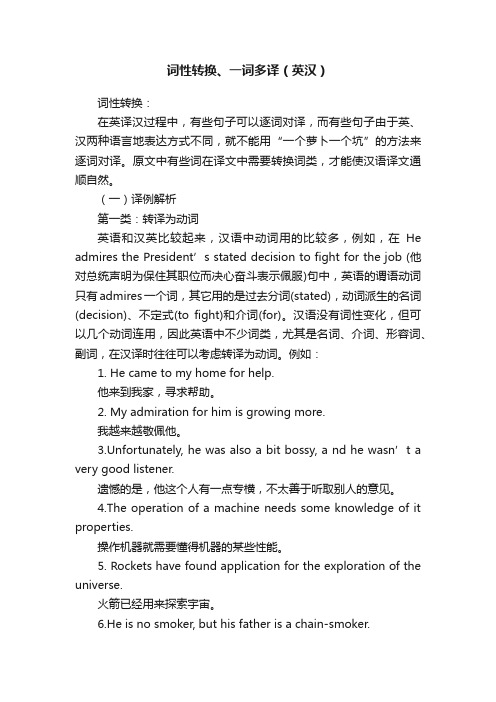
词性转换、一词多译(英汉)词性转换:在英译汉过程中,有些句子可以逐词对译,而有些句子由于英、汉两种语言地表达方式不同,就不能用“一个萝卜一个坑”的方法来逐词对译。
原文中有些词在译文中需要转换词类,才能使汉语译文通顺自然。
(一)译例解析第一类:转译为动词英语和汉英比较起来,汉语中动词用的比较多,例如,在He admires the President’s stated decision to fight for the job (他对总统声明为保住其职位而决心奋斗表示佩服)句中,英语的谓语动词只有admires一个词,其它用的是过去分词(stated),动词派生的名词(decision)、不定式(to fight)和介词(for)。
汉语没有词性变化,但可以几个动词连用,因此英语中不少词类,尤其是名词、介词、形容词、副词,在汉译时往往可以考虑转译为动词。
例如:1. He came to my home for help.他来到我家,寻求帮助。
2. My admiration for him is growing more.我越来越敬佩他。
3.Unfortunately, he was also a bit bossy, a nd he wasn’t a very good listener.遗憾的是,他这个人有一点专横,不太善于听取别人的意见。
4.The operation of a machine needs some knowledge of it properties.操作机器就需要懂得机器的某些性能。
5. Rockets have found application for the exploration of the universe.火箭已经用来探索宇宙。
6.He is no smoker, but his father is a chain-smoker.他不抽烟,但他爸爸却一只接一只不停地抽。
英汉互译中的词性转换探析
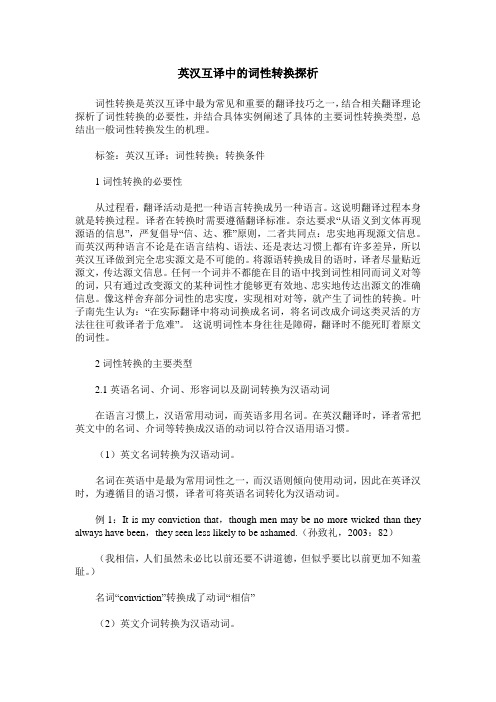
英汉互译中的词性转换探析词性转换是英汉互译中最为常见和重要的翻译技巧之一,结合相关翻译理论探析了词性转换的必要性,并结合具体实例阐述了具体的主要词性转换类型,总结出一般词性转换发生的机理。
标签:英汉互译;词性转换;转换条件1词性转换的必要性从过程看,翻译活动是把一种语言转换成另一种语言。
这说明翻译过程本身就是转换过程。
译者在转换时需要遵循翻译标准。
奈达要求“从语义到文体再现源语的信息”,严复倡导“信、达、雅”原则,二者共同点:忠实地再现源文信息。
而英汉两种语言不论是在语言结构、语法、还是表达习惯上都有许多差异,所以英汉互译做到完全忠实源文是不可能的。
将源语转换成目的语时,译者尽量贴近源文,传达源文信息。
任何一个词并不都能在目的语中找到词性相同而词义对等的词,只有通过改变源文的某种词性才能够更有效地、忠实地传达出源文的准确信息。
像这样舍弃部分词性的忠实度,实现相对对等,就产生了词性的转换。
叶子南先生认为:“在实际翻译中将动词换成名词,将名词改成介词这类灵活的方法往往可救译者于危难”。
这说明词性本身往往是障碍,翻译时不能死盯着原文的词性。
2词性转换的主要类型2.1英语名词、介词、形容词以及副词转换为汉语动词在语言习惯上,汉语常用动词,而英语多用名词。
在英汉翻译时,译者常把英文中的名词、介词等转换成汉语的动词以符合汉语用语习惯。
(1)英文名词转换为汉语动词。
名词在英语中是最为常用词性之一,而汉语则倾向使用动词,因此在英译汉时,为遵循目的语习惯,译者可将英语名词转化为汉语动词。
例1:It is my conviction that,though men may be no more wicked than they always have been,they seen less likely to be ashamed.(孙致礼,2003:82)(我相信,人们虽然未必比以前还要不讲道德,但似乎要比以前更加不知羞耻。
英汉翻译中的词性转换

英汉翻译中的词性转换一、本文概述翻译,作为语言交流的桥梁,在跨文化、跨语言的交流中扮演着至关重要的角色。
英汉翻译,作为其中最为常见和重要的分支之一,其技巧与方法对于提高翻译质量和效率具有深远的影响。
在英汉翻译实践中,词性转换是一种常见的翻译技巧,其运用得当与否直接影响到译文的质量。
本文旨在探讨英汉翻译中的词性转换现象,分析其必要性、常见类型及其在英语汉语言特点下的应用,以期为翻译实践提供有益的参考和指导。
本文将简要介绍英汉翻译中词性转换的必要性,阐述为何在翻译过程中需要进行词性转换,以及这种转换对于提高翻译质量的重要性。
本文将详细分析英汉翻译中常见的词性转换类型,包括名词与动词之间的转换、形容词与副词之间的转换等,并结合具体实例进行说明。
本文将探讨英汉翻译中词性转换的应用策略,结合英语和汉语的语言特点,分析如何在实际翻译中灵活运用词性转换技巧,以实现译文的准确、流畅和地道。
通过本文的阐述和分析,希望能够帮助读者更好地理解和掌握英汉翻译中的词性转换技巧,提高翻译实践中的应变能力和翻译质量,推动英汉翻译事业的不断发展和进步。
二、词性转换的基本概念词性转换,即在翻译过程中,将源语言中的某一词类转换为目标语言中的另一词类,而不改变其原意,是英汉翻译中一种常见的翻译技巧。
这种技巧的运用,旨在使译文更加地道、流畅,更符合目标语言的表达习惯。
在英汉翻译中,由于两种语言的语法结构和表达习惯存在差异,因此,翻译时常常需要进行词性转换。
例如,英语中的动词在汉语中可能需要转换为名词、形容词或副词;同样,汉语中的名词在英语中也可能需要转换为动词、形容词或副词。
这种转换并不是随意的,而是需要基于对源语言和目标语言的理解和掌握,以及对翻译原则的遵循。
词性转换的翻译技巧可以分为两类:一是完全转换,即源语言中的某一词类完全转换为目标语言中的另一词类;二是部分转换,即源语言中的某一词类在转换为目标语言时,仍然保留部分原词类的特性。
浅析英汉翻译中词类转换法的运用

浅谈英译汉中的英汉词性的转换英汉两种语言在词汇和语法结构方面有许多不同之处。
因此,在英译汉过程中,不能逐词逐句翻译。
一方面,汉语词大部分是一词一类,而英语常用词有许多都是一词多类,有的甚至多达五类。
另一方面,汉语一个词能充当的句子成分较多,一般无须转换词类;而英语一个词能充当的句子成分较少,充当不同成分需要转换词类。
翻译时,在忠实原意的前提下,可以把一些英语词性作适当调整,如英文的名词可以转为汉语的动词、副词以及形容词;英文的动词可以转为汉语的名词及副词等。
学过英语的人都知道,英语属于印欧语系,汉语属于汉藏语系。
英汉两种语言在词汇和语法结构方面有许多不同之处。
因此在英译汉的过程中,有些句子可以逐词翻译,有些句子则由于英汉两种语言的表达方式不同,就不能以“挖个坑填个萝卜”方法来逐词对译。
翻译时原文的有些词在译文中需要转换词类,才能使汉语译文通顺自然,即翻译时不必拘泥于原文的表层结构,可以在忠实原意的前提下将原文中有些词的词性转换为汉语的其他词性。
现将英语中的四类主要词性和汉语词性之间的转换介绍如下:一、英语名词的转换(一)英语的名词译成汉语的动词英语和汉语比较起来,汉语中动词用的比较多一些,在英语句中只用一个谓语动词,而在汉语句中可以几个动词连用,因此在一些情况下可以把英语的名词译成汉语的动词,这主要有下列两种情况:作为习语主体的名词往往可以转化为动词。
如:to have a rest中的rest,make no mention of中的mention,pay attention to中的attention,又如take care of中的care这几个词都是短语中的中心词,这些词虽然是名词,但几个短语表达的都是一种动作,再者,rest,mention和care本身既可作名词又可作动词,因此这样有动作意味的名词可以翻译成汉语的动词。
因此这几个英语短语中的名词可以翻译成汉语动词休息、提及、注意和照顾。
浅谈英汉翻译中词性转换的应用技巧

浅谈英汉翻译中词性转换的应用技巧摘要:英语属于印欧语系,汉语属于汉藏语系,两者之间存在很多差异。
在英汉翻译过程中,为了使译文保持原文的内涵,经常会发生词性转变的现象。
换句话说,词性转变既是为了忠实地再现原文信息,又是为了使译文符合汉语习惯,英汉翻译中的词汇转换问题主要源于两种语言的语言结构差异。
本文主要从介绍英汉翻译的四大词性转换技巧角度,分析英汉翻译中的词性转换应用技巧。
有助于译者灵活、合理地使用各种翻译技巧以达到译文语义连贯、信息完整的目的。
关键词:英汉翻译;词性转换;技巧一、引言由于英汉在语法、表达和思维方式上的差异,英汉翻译中必然存在一些问题,给英汉翻译带来很大的困难。
语言的表达有很大的差异。
翻译不流利,欧化现象明显,其主要原因之一是不善于运用词转换和句子成分转换的翻译方法。
本文论述了英汉翻译中部分语音转换的特点和技巧,有助于提高我们的翻译能力,使原始信息更准确、更有效地被接受。
二、国内外翻译中词类转换技术的文献综述词类转换作为最常用、最重要的翻译技术之一,在英汉翻译中得到了广泛的应用,国内外许多翻译专家学者对词类转换进行了研究。
中国的汉英翻译研究比较全面,对翻译技术和形态转换在各个方面的应用进行了研究。
一种是根据语音转换类型分析的不同部分进行的,如吴重阳在《英汉翻译中的汉字语音转换》一书中进行了分析(2014年),案例描述的类型有4种。
此外,张扬在《简论英汉翻译中的词转换》(2016)一书中,详细介绍了英汉四字转换、名词、动词、形容词和介词的转换。
国内外的研究学者,总的来说,经过许多理论成果的翻译转化,随后的经验为我们提供了很多理论支持,而且在技巧上,国内文献也倾向于按照词类的分类,进行较为全面的系统的探讨。
三、英汉翻译中的词类转换技术由于英汉表达方式的不同,英语不可能总是机械地翻译成汉语中的同一部分,例如,把名词翻译成名词,把动词翻译成动词等等。
为了表达原文的内容,有必要改变英语的语言形式。
汉英翻译中的词类转换
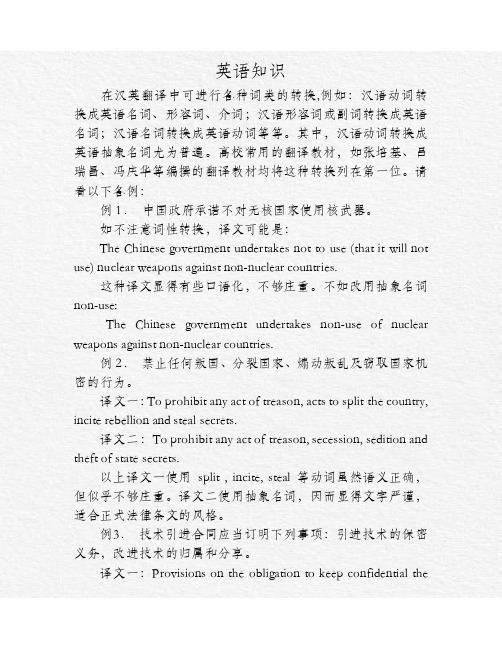
英语知识在汉英翻译中可进行各种词类的转换,例如:汉语动词转换成英语名词、形容词、介词;汉语形容词或副词转换成英语名词;汉语名词转换成英语动词等等。
其中,汉语动词转换成英语抽象名词尤为普遍。
高校常用的翻译教材,如张培基、吕瑞昌、冯庆华等编撰的翻译教材均将这种转换列在第一位。
请看以下各例:例1.中国政府承诺不对无核国家使用核武器。
如不注意词性转换,译文可能是:The Chi nese gov ernmentundertak es not t o use (t hat it w ill notuse) nuc lear wea pons aga inst non-nuclear countri es.这种译文显得有些口语化,不够庄重。
不如改用抽象名词non-use:TheChinesegovernme nt under takes no n-use of nuclear weapons against non-nuc lear cou ntries.例2.禁止任何叛国、分裂国家、煽动叛乱及窃取国家机密的行为。
译文一:To pro hibit an y act of treason, acts t o splitthe coun try, inc ite rebe llion an d stealsecrets.译文二:To prohi bit anyact of t reason,secessio n, sedit ion andtheft of state s ecrets.以上译文一使用split, incit e, steal等动词虽然语义正确,但似乎不够庄重。
译文二使用抽象名词,因而显得文字严谨,适合正式法律条文的风格。
英汉翻译2.词性转换法
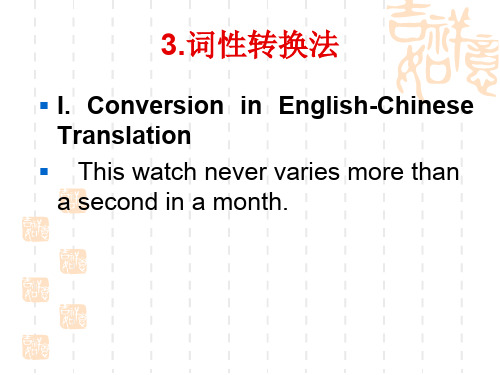
1) adjectives converted nouns
The steam turbine is less economical at cruising speed.
After careful treatment the deaf have recovered their hearing.
Doctors have said that they are not sure they can save his life.
They are quite content with the data obtained from the experiment.
If we were ignorant of the structure of the atom, it would be impossible for us to study nuclear physics.
3.词性转换法
I. Conversion in English-Chinese Translation
This watch never varies more than a second in a month.
1. Conversion into verbs 1) Nouns converted into verbs Rockets have found application for
the exploration of the universe. Some power plants are under
construction. The operation of a machine needs
some knowledge of its performance.
I am afraid I can’t teach you swimming. I think my little brother is a better teacher than I .
翻译的词性转换技

转译成动词
1. Rockets have found application for the exploration of the universe. 2. In China, there is a lot of emphasis on politeness. 3. A careful study of the original text will give you a better translation. 4. The sight and sound of our jet planes filled me with special longing. 5. He is a good singer. 6. Those small factories are also lavish consumer and waster of raw materials.
7. You must be tired. Why don’t you take a rest? 8. I am anxious about his health. 9. Doctors have said that they are not sure they can save his life. 10. Scientists are confident that all matter is indestructible. 11. She opened the window to let fresh air in. 12. After careful investigation they found the design behind.
英汉翻译中词性转换的技巧-PPT资料

(3) Cheerful, efficient and warm-hearted, they will do everything to make your journey smooth and comfortable.
他们乐观、能干、热情,总是想方设法使你一路 上顺利舒适。(状语转换为谓语)
句子成分转换是指英语中的某一句子成分译成汉语时 转换成另一种句子成分。句子成分转换在主语、谓语、
宾语、定语、状语和补语之间展开。
(1) You can always tell the somebodies from the nobodies at a cocktail party. The somebodies come late. 在鸡尾酒会上人们常常可以看出大人物和无名小卒来。那 些迟到的就是大人物。(主语转换为表语;谓语转换为主 语)
她到车站不一会儿,他便出现在她的身旁,听见他喘息的 声音。她凝视着前方,表情严峻。
(5) Yet to both classes the need of an alternative outlook, of a change of atmosphere, of a diversion of effort, is essential.
(13) Most US spy satellites are designed to burn up in the earth's atmosphere after completing their missions.
美国绝大多数间谍卫星,按其设计,是在完成使命后,在 大气层中焚毁。
二、 句子成分转换
(9) He added: "I understand and respect those views, but I deeply believe in the correctness of my decision." 他还说:"我理解并尊重他们的看法,但我深信我的决定 是正确的。"
词性转换、一词多译(英汉)

词性转换:在英译汉过程中,有些句子可以逐词对译,而有些句子由于英、汉两种语言地表达方式不同,就不能用“一个萝卜一个坑”的方法来逐词对译。
原文中有些词在译文中需要转换词类,才能使汉语译文通顺自然。
(一)译例解析第一类:转译为动词英语和汉英比较起来,汉语中动词用的比较多,例如,在He admires the President’s stated decision to fight for the job (他对总统声明为保住其职位而决心奋斗表示佩服)句中,英语的谓语动词只有admires一个词,其它用的是过去分词(stated),动词派生的名词(decision)、不定式(to fight)和介词(for)。
汉语没有词性变化,但可以几个动词连用,因此英语中不少词类,尤其是名词、介词、形容词、副词,在汉译时往往可以考虑转译为动词。
例如:1. He came to my home for help.他来到我家,寻求帮助。
2. My admiration for him is growing more.我越来越敬佩他。
3.Unfortunately, he was also a bit bossy, a nd he wasn’t a very good listener.遗憾的是,他这个人有一点专横,不太善于听取别人的意见。
4.The operation of a machine needs some knowledge of it properties.操作机器就需要懂得机器的某些性能。
5. Rockets have found application for the exploration of the universe.火箭已经用来探索宇宙。
6.He is no smoker, but his father is a chain-smoker.他不抽烟,但他爸爸却一只接一只不停地抽。
7.His mom is a good cook.他妈妈做饭很好吃。
英汉翻译技巧词性转换
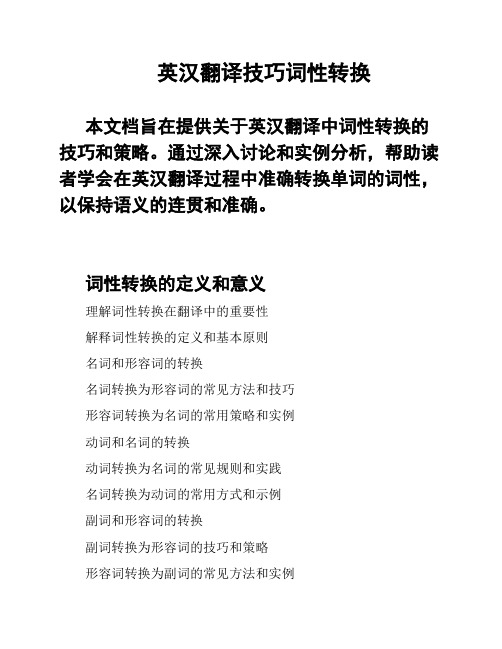
英汉翻译技巧词性转换本文档旨在提供关于英汉翻译中词性转换的技巧和策略。
通过深入讨论和实例分析,帮助读者学会在英汉翻译过程中准确转换单词的词性,以保持语义的连贯和准确。
词性转换的定义和意义理解词性转换在翻译中的重要性解释词性转换的定义和基本原则名词和形容词的转换名词转换为形容词的常见方法和技巧形容词转换为名词的常用策略和实例动词和名词的转换动词转换为名词的常见规则和实践名词转换为动词的常用方式和示例副词和形容词的转换副词转换为形容词的技巧和策略形容词转换为副词的常见方法和实例例句分析与实践提供一些实际例句进行分析和转换实践深入探讨例句中词性转换的技巧和注意事项总结与扩展对本文档中所涉及的词性转换技巧进行总结和回顾提供更多补充资料和延伸阅读资源请注意,本文档的目标是提供简洁明了的指导,避免复杂的法律问题并独立进行决策。
导言请注意,本文档的目标是提供简洁明了的指导,避免复杂的法律问题并独立进行决策。
导言英汉翻译技巧词性转换》是一本重要的翻译技巧手册,它涉及到了词性转换在英汉翻译中的应用。
词性转换指的是将一个词的词性从一种转换为另一种,以达到更恰当地表达原文含义的目的。
英汉翻译技巧词性转换》是一本重要的翻译技巧手册,它涉及到了词性转换在英汉翻译中的应用。
词性转换指的是将一个词的词性从一种转换为另一种,以达到更恰当地表达原文含义的目的。
词性转换在翻译过程中具有广泛的应用领域。
它可以帮助翻译者解决一些句子难以准确翻译的问题,提高翻译质量和可读性。
无论在文学作品、商务文件还是学术论文等领域,词性转换都起到了不可忽视的作用。
在《英汉翻译技巧词性转换》中,我们将介绍一些简单且没有法律复杂性的策略和技巧,旨在帮助翻译者更好地掌握词性转换的方法。
我们鼓励翻译者发挥自己的优势,并遵循简洁明了的原则,不引用无法确认的内容。
无论是英汉互译还是汉译英,词性转换都是一个关键技巧。
通过研究和掌握《英汉翻译技巧词性转换》,您将能够更好地处理词性转换的问题,提升翻译水平。
英译汉词性转换
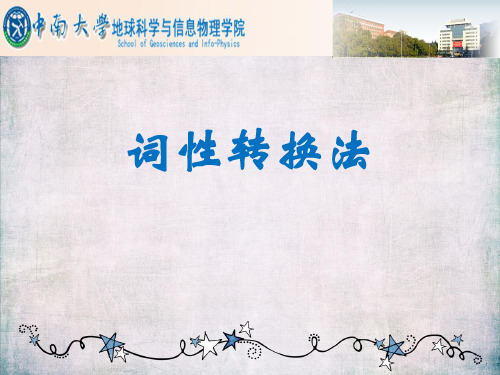
转换成名词的情况——形容词转换成名词 • 1)英语中,当形容词前加上定冠词the 时, 常转换成名词。 例:They did their best to help the sick and the wound. 他们尽了最大的努力帮助病号和伤员。
• 2)英语中,有些表事物特征的形容词用作 表语时,往往转换成汉语名词[9]。 例:Computers are more flexible, and can do a greater variety of jobs.
转换成动词的情况—e people in the mountainous areas are finally off poverty. 千百万山区人终于摆脱了贫困。
转换成动词的情况——形容词转换成动词 英语中表示知觉、情感、欲望等心理状 态的形容词,在系动词之后作表语时,可转 译成汉语动词,如confident, certain,careful, cautious, angry, sure, ignorant, afraid, doubtful, aware,concerned, glad, delighted, sorry, ashamed, thankful, anxious,grateful, able 等。
例:They are quite content with the data obtained from the experiment. 他们满足于在实验中获得的数据。 例:Doctors have said that they are not sure they can save his life. 医生说他们不敢肯定能否救得了他的命。
其它词类的转换——形容词和副词的相互转换 • 由于英语的名词或动词可以分别转换为汉 语的动词和名词,而修饰名词的形容词和 修饰动词的副词也可以随之转换为汉语的 副词和形容词。 • 1)英语名词译作汉语动词时, 修饰该名词 的形容词可译作汉语副词。
8.词类转译
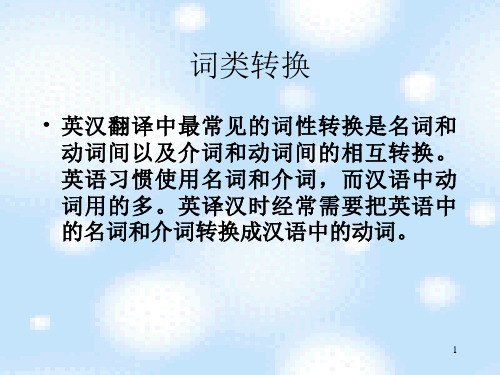
12
8. 词类转译——汉译英的词类转换
2. 名词转译为动词
1) 结婚戒指是夫妇结合的象征。 A wedding ring symbolizes the union of husband and wife. 2) 工厂必须把增加产量作为自己的目标。 The factory must aim at an increase in production.
3
8. 词类转译——英译汉的词类转换
2. 动词转译为名词
A. 名词派生的动词 1) An interest in people’s deepest feelings characterizes all her writings. 对人们最深沉感情的关注,是她所有著作的特征。 2) She personifies beauty and grace.
她是美丽与优雅的化身。
B. 名词转用的动词 1) You can see what a Dodo looked like from the picture. 你可从照片中得知渡渡鸟的模样。 2) These exercises are designed to strengthen the muscles. 这些锻炼的目的是为了增强肌肉。
1) We have ruled out tool use and invention as ways of telling animal behavior from human behavior.
我们已经把使用和发明工具,从区分动物和人类行为的方法 中排除出去了。 2)Another way of dealing with enemies is either to have a very good protection or to be able to escape quickly. 还有一种对付敌人的方式是,要么防卫可靠,要么能够迅 速逃跑。
英汉翻译中词性转换的技巧

In science, it is important to state a law or a principle accurately. 在科学方面定律或定理的准确叙述十分重 要。 With slight repairs, the machine could be in motion. 只要称加修理,这台机器便可以运转。 From the front, back and both sides we kept a strict watch on the enemy. 我们在前后左右严密地监视敌人。
Exercise
Difference between the social system of states shall not be an obstacle to their approach and cooperation.
国与国社会制度的不同应妨碍彼此的接近与合 作。 It is our goal that the people in the undeveloped areas will be finally off poverty. 我们的目标是使不发达地区的人民最终摆脱贫 困。
英汉翻译中词性转换的技巧
由于英汉两种语言在语法和表达方式 等方面存在着许多差异,因此英译汉 时常常有必要改变表达方式,使译文 通顺流畅、地道可读。这种变通技巧 就是转换法(shift of perspective)。转 换的形式多种多样,大体可分为7种: ①词类转换,②句子成分转换,③表 达方式转换,④自然语序与倒装语序 转换;⑤正面表达与反面表达转换, ⑥主动式与ey had a dozen children, six boys and six girls, in seventeen years. 在17年中,他们生了12个孩子,6男6女。 (5) She has been a widow only for six months. 她丈夫死了至今才不过半年。 (原文是从妻子的角度加以陈述的,而译文是从 丈夫的角度加以陈述的。如果不改变表达方式, 而搬用原来的表达方式,那译文就是:"她只当了 6个月的寡妇。"这就会给人以错觉:她很快就改 嫁了。) (6) ──Is there a special rate by the month? ──Yes, there is a 10% discount. ──按月计算有什么优惠吗? ──有,可以打9折。
英汉翻译:词类转换法
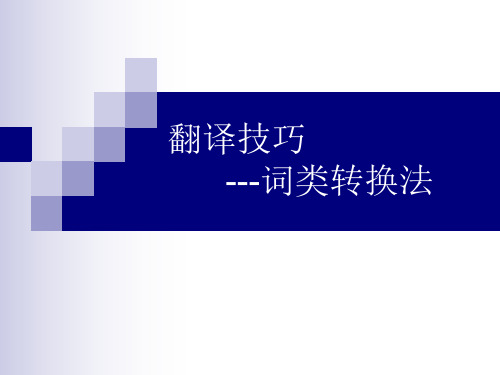
一、 转译成动词 (Converting into verbs)
1. 名词转译成动词( n.---v. )
n 英语中具有动作意义的名词,汉译时往往可转化为动词。
n Families upstairs have to carry pails to the hydrant downstairs for water.
n Double windows were fixed to keep the cold out. n 安装双层窗御寒。
动名词转译成动词(gerund---v.) n The origin of this particular culture is far from clearing. n 这种奇特的文化根源远没有弄清楚。
n 他们尽了最大的努力帮助病号和伤员。
n Both the compounds are acids, the former is strong, the latter weak.
n 这两种化合物都是酸,前者是强酸,后者 是弱酸。
3. 代词转译为名词 (pron. --- n.) n Radio waves are similar to light waves except
“来啦!”她转身蹦跳着越过草地,跑上小径, 跨上台阶,穿过凉台,进了门廊。
n Party officials worked long hours on meager food, in cold caves, by dim lamps.
党的干部每天长时间工作,吃的是粗茶淡饭, 住的是冰冷的窑洞,点的是黯淡的油灯。
公司在报上登广告招聘电子方面的专家。
n A force is needed to move an object against inertia.
浅谈英译汉中的英汉词性的转换
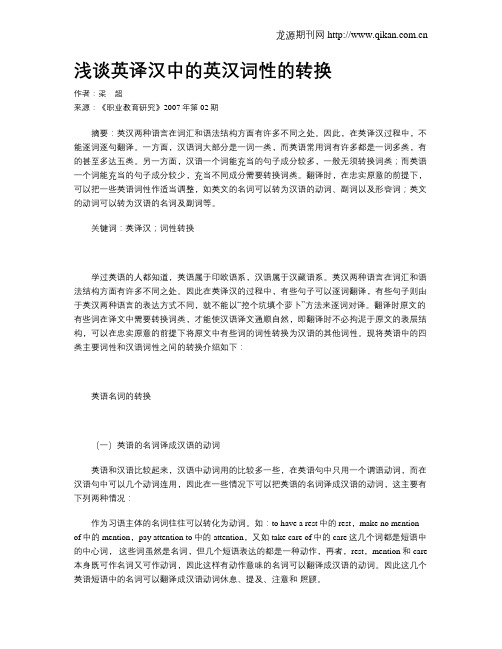
浅谈英译汉中的英汉词性的转换作者:梁超来源:《职业教育研究》2007年第02期摘要:英汉两种语言在词汇和语法结构方面有许多不同之处。
因此,在英译汉过程中,不能逐词逐句翻译。
一方面,汉语词大部分是一词一类,而英语常用词有许多都是一词多类,有的甚至多达五类。
另一方面,汉语一个词能充当的句子成分较多,一般无须转换词类;而英语一个词能充当的句子成分较少,充当不同成分需要转换词类。
翻译时,在忠实原意的前提下,可以把一些英语词性作适当调整,如英文的名词可以转为汉语的动词、副词以及形容词;英文的动词可以转为汉语的名词及副词等。
关键词:英译汉;词性转换学过英语的人都知道,英语属于印欧语系,汉语属于汉藏语系。
英汉两种语言在词汇和语法结构方面有许多不同之处。
因此在英译汉的过程中,有些句子可以逐词翻译,有些句子则由于英汉两种语言的表达方式不同,就不能以“挖个坑填个萝卜”方法来逐词对译。
翻译时原文的有些词在译文中需要转换词类,才能使汉语译文通顺自然,即翻译时不必拘泥于原文的表层结构,可以在忠实原意的前提下将原文中有些词的词性转换为汉语的其他词性。
现将英语中的四类主要词性和汉语词性之间的转换介绍如下:英语名词的转换(一)英语的名词译成汉语的动词英语和汉语比较起来,汉语中动词用的比较多一些,在英语句中只用一个谓语动词,而在汉语句中可以几个动词连用,因此在一些情况下可以把英语的名词译成汉语的动词,这主要有下列两种情况:作为习语主体的名词往往可以转化为动词。
如:to have a rest中的rest,make no mention of中的mention,pay attention to中的attention,又如take care of中的care这几个词都是短语中的中心词,这些词虽然是名词,但几个短语表达的都是一种动作,再者,rest,mention和care 本身既可作名词又可作动词,因此这样有动作意味的名词可以翻译成汉语的动词。
- 1、下载文档前请自行甄别文档内容的完整性,平台不提供额外的编辑、内容补充、找答案等附加服务。
- 2、"仅部分预览"的文档,不可在线预览部分如存在完整性等问题,可反馈申请退款(可完整预览的文档不适用该条件!)。
- 3、如文档侵犯您的权益,请联系客服反馈,我们会尽快为您处理(人工客服工作时间:9:00-18:30)。
